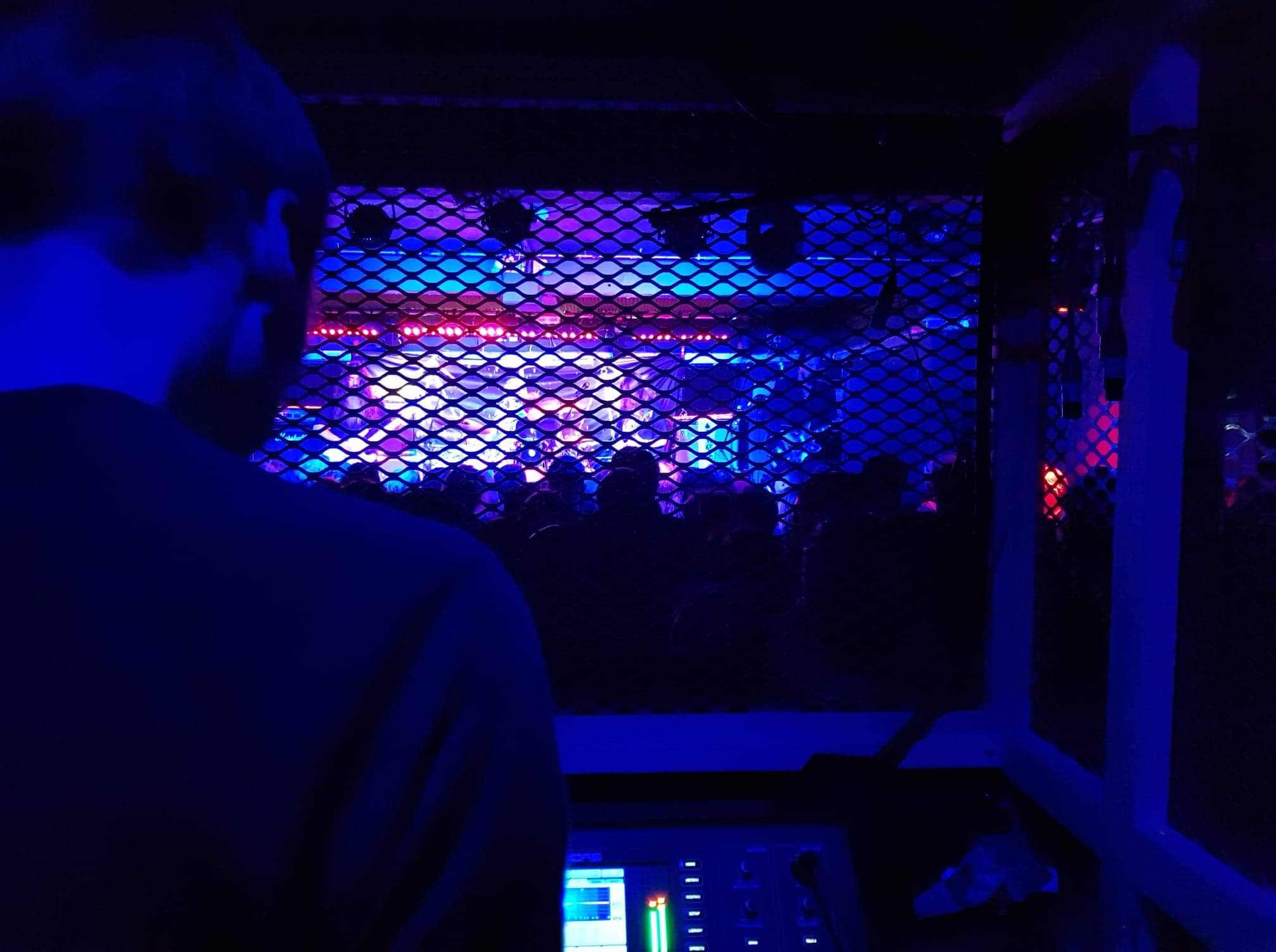Alt-J’s Joe Newman: “My relationship with playing guitar has changed... in lockdown I got really into guitar YouTubers. I started readdressing how I wanted to play”
Ahead of the February release of Alt-J’s new album, The Dream, Newman joined us to talk songwriting, his rekindled love for guitar, and the revolutionary Fender Acoustasonic Telecaster
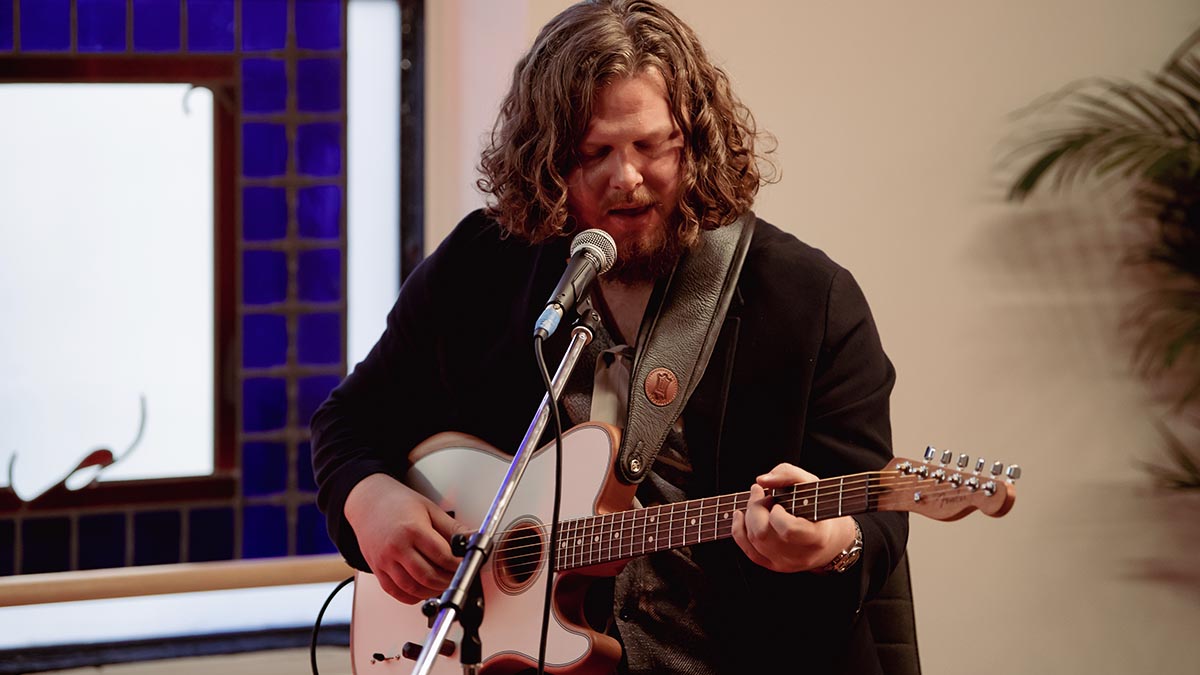
Want all the hottest music and gear news, reviews, deals, features and more, direct to your inbox? Sign up here.
You are now subscribed
Your newsletter sign-up was successful
Fronted by Joe Newman’s unique hushed croon and delicate, pattern picked guitar style, Leeds-based Alt-J are an indie-rock band with an inimitable identity.
It is one that has kept them at the forefront of people's minds since 2012 debut An Awesome Wave, even while taking lengthy breaks and doing things on their own terms.
Now gearing up to release their fourth album, The Dream, the band performed live for the first time in two years at Fender's London HQ to celebrate the release of the Player Series Acoustasonic Telecaster – the latest and most-affordable Acoustasonic yet.
We spoke with Newman after this performance about his experience playing with the Acoustasonic, and how guitar is engrained in the DNA of Alt-J's songwriting, and discover why he is a more confident and motivated than ever.
Yesterday was the first time you’ve performed live as Alt-J in quite a while. Tell us a bit about that. How did it go, and how did it feel to be back playing again?
“It went really well, and I think it was a successful performance. Playing to a smaller crowd can be a little more daunting because you can see everyone in the room. You can hear people breathing. You can hear people react to things that they like or don't like.
“It’s very much tied to the same experience that they are having, as opposed to playing onstage to a lot more people. You can become more disconnected in bigger venues and the audience becomes like a carpet rather than a crowd of people.
Want all the hottest music and gear news, reviews, deals, features and more, direct to your inbox? Sign up here.
“Playing yesterday, I was very much aware that this was an experience that I had in the past but it had been four years. You feel very nervous getting onstage, and then you just focus on each song and get through it. But the whole thing was great,
“Fender did an amazing job and my voice felt like it was on point. I wasn't sure if it was going to be, because my daughter has had a cold that I kind of picked up too. It meant that my voice for the last five days has been faltering, but it came through on the night.”
You played six songs and exclusively used the Fender Player Acoustasonic Telecaster. What’s your experience been like playing that guitar and how does it fit your playing style?
“It certainly fits with my playing style. I think one of the great things about that guitar is that it fits with most playing styles. For me, I’ve grown up as a pattern picker and had this mathematical way of playing patterns on the strings.
“I had it on the neck pickup and blended between parlour and jumbo, and it was just beautiful. At first I thought the blending knob was just for tone, but it’s actually blending two different pickups in quite a mathematical kind of way. I really like how it fits with my playing style.
There’s something about the Acoustasonic where, even if you're just playing it as a solely acoustic guitar and not using the pickups, it’s got a very friendly nature
It was a stripped back set as a duo. Did you have to adapt the songs at all, or does the hybrid design of the guitar make it easily transferrable?
“We don't actually have to worry about that too much because a lot of our songs are written on guitar to begin with, so the whole structure of our songs is written on guitar before we go into the studio. We just have to hark back to the time when we were first writing it so there’s not much adaptation.
“I think with guitars, it takes a lot of work to get into them. I think there’s something about the Acoustasonic where, even if you're just playing it as a solely acoustic guitar and not using the pickups, it’s got a very friendly nature.”
“The neck is thin and shaped back, and there’s a very limited curve to the fretboard which makes it play really easily. I think that’s when you start falling in love with your instrument, when you’re not thinking about playing it while you're playing it. I think that unconscious connection happened quite early with the Acoustasonic.
“Each pickup switch is like a plugin, and you realise that this is quite a complex and important guitar in terms of how it is revolutionising the way in which you can connect with how versatile it can be.
Everything is written on guitar to begin with, but for the track to grow, you can’t strictly see it as a guitar song
You mentioned how everything starts on the guitar. On your new single, U&ME, guitar is very blended in to the overall sound rather than standing out and being a lead instrument. Is that something we can expect to hear more on your new album?
“There are greater tracks with greater dynamics for the guitar than U&ME; that song doesn't necessarily represent the album that well in terms of guitar work. Everything is written on guitar to begin with, but for the track to grow, you can’t strictly see it as a guitar song.
“You do have to take out a bit of [the] guitar to offer a greater sense of dynamism for the song in general, so it can’t be seen as a ‘guitar song’ – it has to be all of us playing our instruments and discovering which instrument suits that moment best.”
“Normally each song starts on an acoustic guitar. I've got a parlour guitar that I’ve been playing a lot the last two years, on which I wrote most of the songs. It's a Larrivée, and I just took it with me as it was just so convenient. Now that I've got the Acoustasonic though, that’ll definitely take over.”
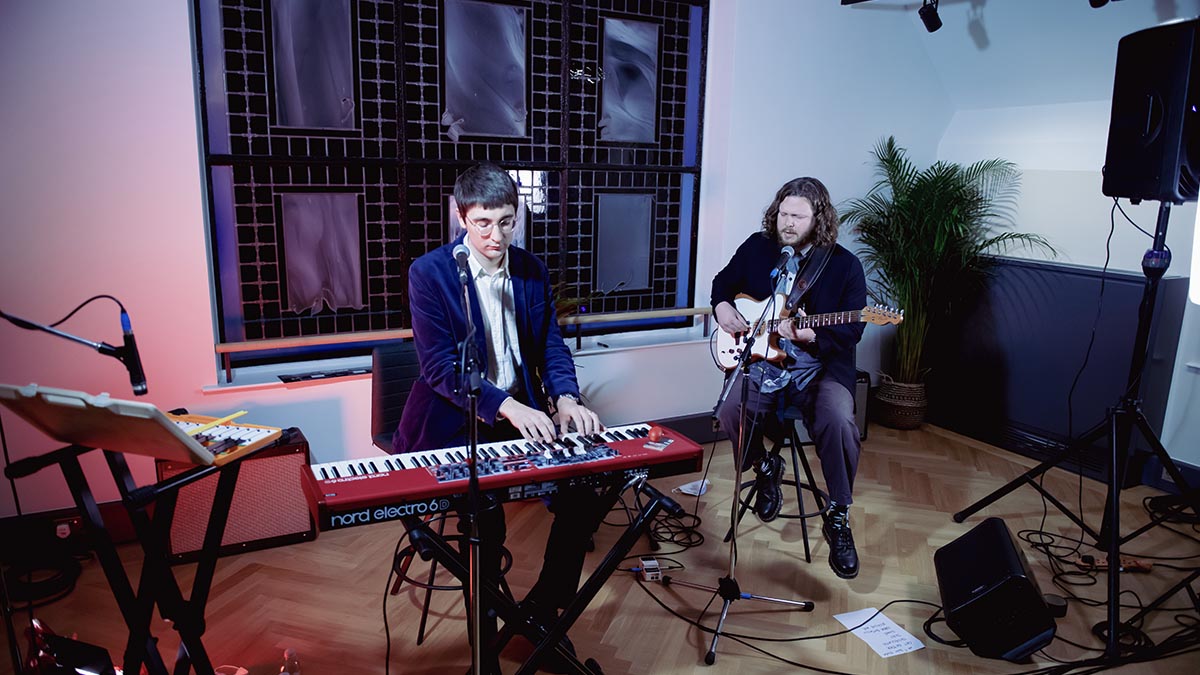
You mostly use electric guitars live. Are there any pedals or effects you can’t live without, or that have become important in helping to craft your sound?
“I think the defining guitar sound is tremolo. We use an old Vox AC30 and have used that for all of our albums to date. I believe it used to be owned by David Gilmour, before being passed to Clive Langer, and now Charlie Andrew is the steward for the amp and has had it in his studio since 2012.
“All of the sounds made on guitar go through that amp and I think everything sounds better through that tremolo input. Then we use [a Roland] Space Echo a lot with the tremolo, and we reamped everything on our new album back through the Vox AC30 and that Space Echo as well.
“I’d say the sound on this album has been very much frozen within the sound of that amp, with the help of that Space Echo.”
With the Acoustasonic, have you been using it DI’d right into the PA or through an amp, and which works better for your style?
“Yesterday, we did it through the PA because it was easier. I’ve been playing the Acoustasonic at home through an amp, though. I have an old Vox TV amp and it just sounds beautiful through that.
“I really want to see what the Acoustasonic will do in the studio, so I would probably play it through that old AC30 to record. Live, I’m hearing things through the wedges, so I don’t know if it’s a perfect representation of what the audience would hear.
“For me, at the moment because I play electric guitar onstage, the electric pickup on the Acoustasonic has a Telecaster pickup and I’d probably play that onstage for sure. Definitely through the PA as well, though!”
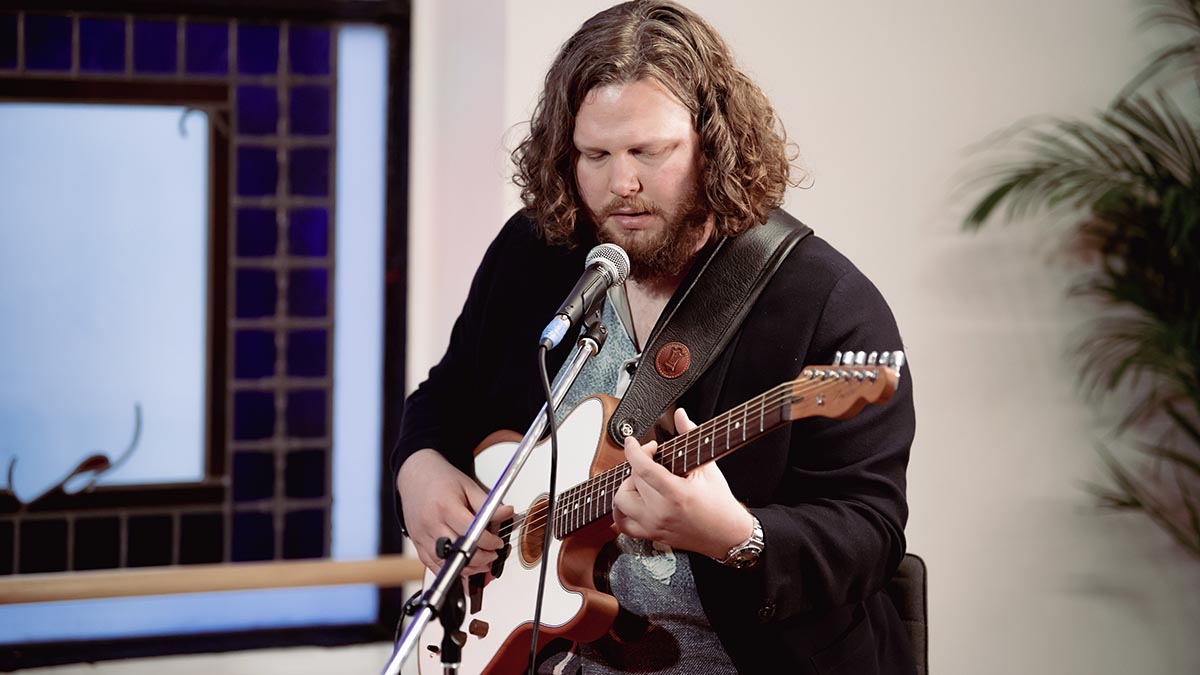
Can you talk a bit about the songwriting process for the new album The Dream and the role of guitar in it? How has it evolved since you started the band?
“Guitar plays a very leading role in writing songs. It’s almost like I can't write a song without a guitar at this point. It’s a crucial instrument and instrumental to the process of songwriting for us.
“My relationship with playing guitar has changed, though, because in lockdown I got really into guitar YouTubers and guitar stores that have great YouTube channels – such as Norman’s Rare Guitars. I started readdressing how I wanted to play my instrument.
“I saw myself as a songwriter and not a guitarist, and I’ve been going through a development where I’m seeing myself down the line as a guitarist just as much as I am a songwriter. I think it was quite a breakthrough with reanimating my love for guitar through this album.”
“The only guitar I had in my house was the aforementioned parlour guitar; I didn’t really pay much respect to guitars other than I needed one to write songs on. Now, though, I think they’re beautiful. I bought multiple new guitars in the space of six months.
“A lot of people got cabin fever energy during the first lockdown and channelled that into buying lots of something. For me, that was guitars! That definitely had an impact on the writing for this album. A lot of lockdown was spent not knowing when we were going to be back in the studio, so I kept working in my home studio.”
How important has technology been in the evolution of the band, and in enabling you to continue to make music?
“I think technology hasn’t played a big role in writing music. I can’t actually think of anything worse than jamming with the band over Zoom, for example.
“There are lots of undefined subtleties of being with someone in person that go into working together and working out ideas, and being in the same space, responding to someone and their body language, being lost in the same sound that’s in the room. That’d be completely lost remotely. I’m not saying you can’t write music that way, but it is so far from ideal for us that it’s not even worth doing.”
“We do use Pro Tools, and Pro Tools is undeniably a vital part of how we work in the studio because it is the software that our producer is beyond comfortable with and can use effortlessly.
“Things are made and ideas are born, and those ideas are formatted through Pro Tools in a matter of minutes because of his fluency with it, so obviously Pro Tools is really important for our writing. Personally though, I don’t work where I am by a laptop and exchanging riffs over the cloud. I’m not saying it wouldn’t work, just that I’ve never done that before.”
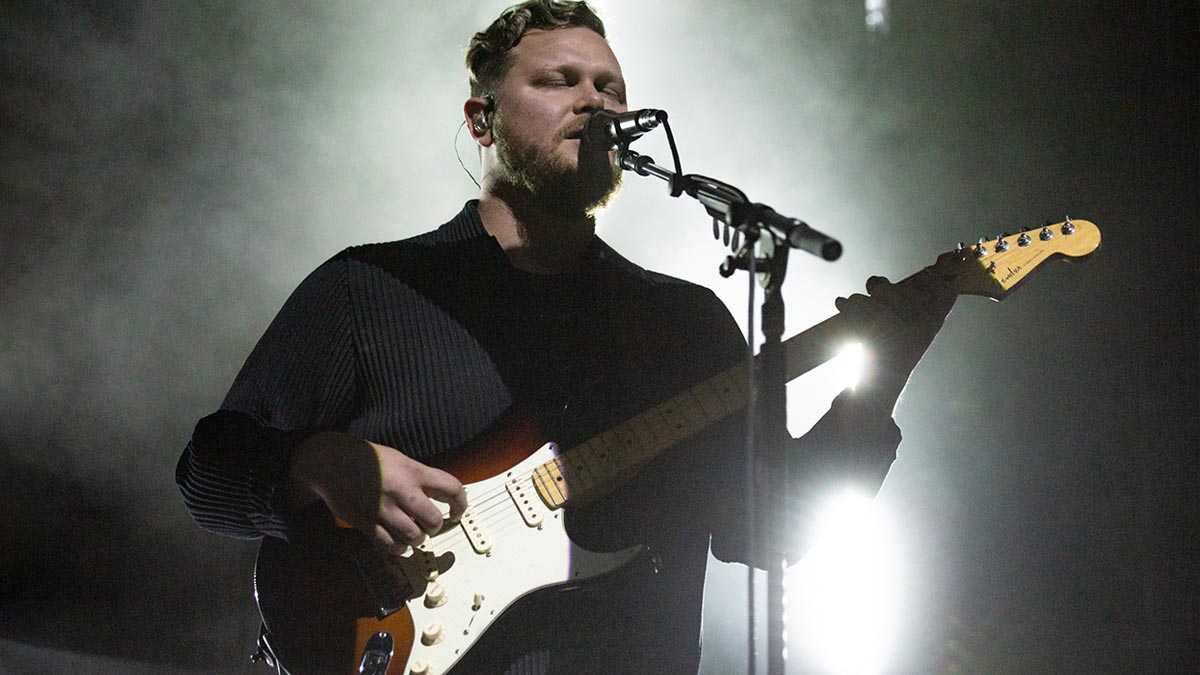
You said that you've always considered yourself more of a songwriter than a guitarist – can you talk a bit about how that evolved alongside your singing and lyricism?
“Over the course of a decade, you inevitably evolve and there is a desire to keep that evolution as organic as possible. You don’t want to think about where popular music is going and then adapt yourself to where the money is. You want to just hang out and play music with your friends, and we are lucky enough that has become our occupation now. We don't need to do part-time jobs to keep that dream alive; this is our job, so we kept that process going. We’re quite insular in our writing.
“I was actually listening to our first album, which came out in 2012. I was listening to my vocals and was particularly struck by how annoying I sounded at certain points! That was actually a criticism levelled towards us too at the time – some people said they couldn’t bear my voice, and that it ruined the songs, and at the time I took it quite personally. But with hindsight I kind of understand.
“I was someone who was quite self-conscious about their singing and had a certain way of responding to it. I’m still really proud of that album, though, because we achieved a lot with that voice and those songs, but over the course of 10 years, I’ve become more comfortable with singing to people and singing live, as well as recording and hearing my voice.
“I’ve settled a bit. When you settle, you relax, and as a result, I think my voice has relaxed too. Through that process of relaxation, I’ve created more of a dynamic range and having realised that on the last album, I’ve put that into play more. I’m more proud of how my voice sounds on this album. Having gone through an evolution from being self-conscious to being proud, I think that was a big development for me.”
I’m more proud of how my voice sounds on this album. Having gone through an evolution from being self-conscious to being proud, I think that was a big development
The album is out in February. What does the future hold after that?
“We would love to get back on tour. It’s booked, but who knows what will happen? The pandemic is still as unpredictable as it has ever been, and at the moment we are just focused on hoping that things aren’t cancelled. Those things can bring bands to their knees – but playing the album live is where all of our focus is at the moment.”
- The Dream is available to preorder and is released on 11 February via Canvasback / Infectious Music.
Sam Drower is a sound engineer, musician and all-around music junkie based in Bristol, UK. He began contributing to MusicRadar in 2020, when the global pandemic brought live music to a screeching halt. When not behind the mixing desk for various bands, he is playing bass for blackened mathcore group Host Body.
